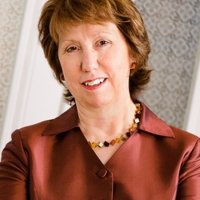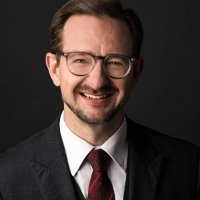Conflict Prevention in a Changing World: The Role of International Organizations
In this conversation, the Right Honourable Catherine Ashton, Foreign Minister of Slovakia and OSCE Chairperson-in-Office Miroslav Lajčák, and OSCE Secretary General Thomas Greminger discussed the challenges of preventing conflicts and the critical role of international cooperation in today’s dynamic security environment.
Selected Quotes
The Right Honourable Catherine Ashton
“[The Global Europe Program] is looking at the issues and relationships that affect the way the continent of Europe acts, the way it's able to progress, and affects how it relates to itself and, obviously, in the course of thinking about that, we think very much about individual countries and collectively Europe in its relationship with the international organizations and frameworks that we have in our world, and especially those that Europe is directly engaging with."
Ambassador Thomas Greminger, Secretary General, Organization for Security and Co-operation in Europe (OSCE)
"When we talk about effective multilateralism, there is the part of member states, participating states, taking advantage of what is being offered, the tools of a multilateral organization. But I would also argue there is a part [played] by the organization itself. There is a constant challenge to remain faithful [to the] purpose. To make sure that the organization is capable of responding to evolving security challenges.”
“We are an inclusive dialogue platform that could be used much more extensively, for instance, to address issues regarding the ever-widening East-West divide…. I find myself often quite frustrated…. Major stakeholders are quite reluctant to engage, and I wish they would and I think we would have something on offer that could produce responses to current security challenges … Instead, what we see is more unilateral, transactional approaches at the notion of tackling security challenges in a cooperative way.”
“I think you need leadership. Leadership can come from major political stakeholders. If you look at the history of the CSCE and the OSCE, it has also, over a significant period of time, it has come from smaller states, because they have a particular stake in promoting cooperative approaches to security. But there is clearly a need for political leadership … If you expect an international organization to deliver, you need also to be ready to invest in terms of financial and human resources.”
H.E. Miroslav Lajčák, Minister of Foreign Affairs, Slovak Republic; former President, United Nations General Assembly
“When we are trying to assess the role of international organizations, we have to go back in history to the moment after World War II, when most of the international organizations were created. Why was that? Simply, because humankind realized we came to the verge of a catastrophe, and we tried to make sure that this would not happen again in the future.”
“Being a member of the EU, NATO, Council of Europe, I’m set to say that most of these organizations are underperforming now. And it’s not the organizations to blame, it’s us to blame – the member states or the participating states. We are not using the potential of the international organizations … It is as if we are forgetting why we have created these international organizations.”
“It suits to some not to play by the rules, and therefore to avoid the organizations that are here to protect the rules. But if we don’t have the system that is based on rules, then we have a system that is based on strength. And we had this in the past, and we know how it ended up, and I’m very worried that we seem to have forgotten the lessons of history.”
“Instead of criticizing the organizations, use their potential. Update [them], of course, and make them fit for the twenty-first century. But don’t forget why they have been created in the first place.”
“If you have to go and beg for money, if you need donors, then, obviously, it damages the transparency, predictability, [and] independence of the organizations. I was sometimes joking at the UN that we [were] turning United Nations into the largest non-governmental organization. Because the member states, as a rule, agree on something, but then they refuse to provide funding for that… These organizations are not our enemies. They are not independently existing creatures. They are our platforms, our instruments. So if you want them to deliver, we must be able to provide proper funding.”
Speakers

Former Vice President of the European Commission and former High Representative of the EU for Foreign Affairs and Security Policy


Hosted By

Global Europe Program
The Global Europe Program is focused on Europe’s capabilities, and how it engages on critical global issues. We investigate European approaches to critical global issues. We examine Europe’s relations with Russia and Eurasia, China and the Indo-Pacific, the Middle East and Africa. Our initiatives include “Ukraine in Europe”—an examination of what it will take to make Ukraine’s European future a reality. But we also examine the role of NATO, the European Union and the OSCE, Europe’s energy security, transatlantic trade disputes, and challenges to democracy. The Global Europe Program’s staff, scholars-in-residence, and Global Fellows participate in seminars, policy study groups, and international conferences to provide analytical recommendations to policy makers and the media. Read more
